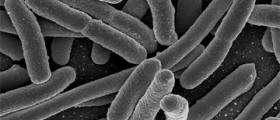Intestinal bacterial infection
Intestinal bacterial infection is a condition that occurs when the bacteria affects the intestinal region and causes inflammation. The bacteria that are responsible for the intestinal infection may penetrate into the body through contaminated water and food.

Types of intestinal bacterial infections
There are several well-known intestinal bacterial infections, such as botulism, cholera, Escherichia coli infection, dysentery and salmonelleosis, as well as typhoid fever.
Botulism is an intestinal infection caused by the bacteria Clostridium botulinum, which enter the body when one consumes contaminated water. The most common symptoms of this intestinal infection are problems with vision, such as double vision or vague vision, dry mouth and difficulty while swallowing. Furthermore, one who suffers from botulism may experience muscle weakness, slurred speech and vomiting. One of the most serious symptoms of this condition is respiratory failure, which may be even fatal. Another intestinal bacterial infection is cholera, which is caused by the bacteria Vibrio cholerae. The main source of these bacteria is fecal contaminated water and people who suffer from cholera usually have symptoms such as watery diarrhea, nosebleeds, nausea and vomiting, as well as muscular cramps and rapid heart rate. The most serious sign of this condition is hypovolemic, which is fatal when it occurs. Escherichia coli are the bacteria responsible for the occurrence of Escherichia coli intestinal infection. In the majority of cases, one gets infected through contaminated drinking water and the main symptom of this intestinal infection is diarrhea, which leads to dehydration. If it is not treated in time, death may occur, especially in those patients with a weak immune system. Dysentery is an intestinal infection that occurs when drinking water contaminated with the bacteria Shigella dysenteriae. The most frequent symptom of this condition is feces with blood or mucus. Salmonellosis is an infection caused by many species of Salmonella. Diarrhea, abdominal cramps and vomiting are the most common symptoms of this intestinal bacterial infection. Salmonella typhi are the bacteria that cause typhoid fever and people who get infected with these bacteria may experience constant fever, excessive sweating and diarrhea. This infection should be treated immediately because if it progresses, it leads to delirium, swollen spleen and enlarged liver. The patients may die after four weeks.Intestinal bacterial infections usually tend to occur during summer months or during rainy seasons. It is important to cut nails short even twice a week if necessary, and wash hands before eating. Furthermore, only boiled water should be consumed and the food must be fresh and eaten warm since these are the only ways in which intestinal bacterial infections may be prevented.










_f_280x120.jpg)






Your thoughts on this
Loading...